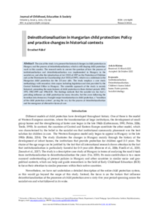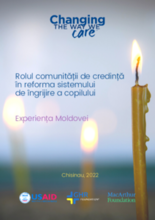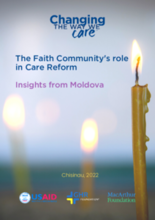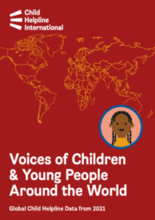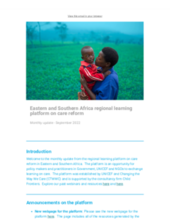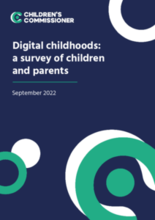Displaying 31 - 40 of 1727
The aim of the study is to present the historical changes in child protection in Hungary and the process of deinstitutionalisation.
Four Family for Every Child member organisations share their experiences and perspectives on supporting the mental health of vulnerable children, building on discussions from their last event:
În primăvara anului 2021, programul Changing the Way We Care (CTWWC) a lansat un sondaj pentru a studia comunitatea de credință din Moldova și implicarea acesteia în reforma sistemului de îngrijire a copiilor. Scopul acestui sondaj a fost de a înțelege mai bine angajamentul actual și potențial al organizațiilor și liderilor de credință în calitate de persoane de influență și furnizori de servicii, dar și de a identifica orice obstacole în calea implicării acestora în reforma respectivă.
This report details Changing the Way We Care's enquiry into the faith-based community in Moldova and its involvement in the ongoing reform of care for vulnerable children.
In order to understand the issues faced by the children and young people who get in touch with child helplines, Child Helpline International interviews members around the world every year to gather information about the contacts they receive. This report provides an overview of the information recieved for 2021.
This report reviewed evidence for the effects of psychosocial neglect on development derived from studies of young children raised in U.S. institutions. In these caregiving environments, children are physically safe and receive instrumental care, but the social, emotional, and cognitive components of caregiving are impoverished. The damaging and often lasting effects of these caregiving environments on young children's development underscore that psychosocial neglect should be considered as dangerous to child well-being as physical maltreatment.
Annual report of the Special Representative of the Secretary-General (SRSG) on Violence Against Children to the UNGA. SRSG reports annually to the Human Rights Council and the General Assembly on progress achieved and lessons learned on the protection of children from violence.
This is the monthly update of the Eastern and Southern Africa Regional Learning Platform published in September 2022.
This report aims to understand digital childhoods, and what can be achieved through the Online Safety Bill to protect children online. The Children’s Commissioner’s Office (CCo) commissioned a survey of 2,005 children aged 8-17 and their parents. This survey is nationally representative of children in England, by age, gender and region. All statistics mentioned in this report are from this survey.
The Children Act, 2022, is an act of Parliament to give effect to Article 53 of the Constitution; to make provision for children rights, parental responsibility, alternative care of children including guardianship, foster care placement and adoption; to make provision for care and protection of children and children in conflict with the law; to make provision for, and regulate the administration of children services; to establish the National Council for Children’s Services and for connected purposes.

